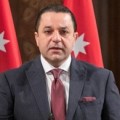|
Location: IMF Connect
 |
Mohamad Al-Ississ Minister of Finance to the Hashemite Kingdom of Jordan |
Mohamad Al-Ississ serves as Minister of Finance to the Hashemite Kingdom of Jordan, after serving as Minister Planning and International Cooperation and State Minister for Economic Affairs. He was formerly Special Advisor to His Majesty King Abdullah II, Advisor to His Majesty King Abdullah II for Economic Affairs, and Director of Economic and Social Development in the Office of His Majesty at the Royal Hashemite Court.
Dr. Al-Ississ has extensive experience in academia. From 2010-2016 he was an Assistant Professor and Associate Dean at the American University in Cairo, as well as a visiting lecturer at Harvard Kennedy School. He is also a founding professor of the first massive Arabic course at Edraak, an online learning platform in partnership with Harvard University and MIT’s EdX platform.
Dr. Al-Ississ’ professional positions include Associate Consultant at Boston Consultancy Group; Manager for Investment Promotion at USAID’s AMIR program; and Senior Competition Advisor to Jordan’s Minister of Industry and Trade.
Earning his PhD in Economic Development and Public Policy from Harvard University, Dr. Al-Ississ also obtained two master’s degrees from Harvard in Public Administration/International Development and Middle Eastern Studies, as well as a bachelor’s degree in Economics with Honors.
Dr. Al-Ississ is a member of the Global Agenda Council at the World Economic Forum, a Fulbright scholar, and a published author on a range of topics including the elasticity of trust, the impact of faith on economic behavior, health reform, and aid allocation.
 |
Jihad Azour Director Middle East and Central Asia Department, IMF |
Jihad Azour is the Director of the Middle East and Central Asia Department at the International Monetary Fund where he oversees the Fund’s work in the Middle East, North Africa, Central Asia and Caucasus.
Mr. Azour served as Lebanon’s Finance Minister in 2005-08, during which time he coordinated the implementation of important reforms, including modernizing the country’s tax and customs systems. Before and since his time as finance minister, he held a wide range of positions in the private sector, including McKinsey and Booz and Co. where he was a Vice-President and Senior Executive Advisor. Prior to joining the IMF in March 2017, he was a Managing Partner at investment firm Inventis Partners.
Mr. Azour holds a PhD in International Finance and a post-graduate degree in International Economics and Finance, both from the Institut d'Etudes Politiques de Paris. He also did research on emerging economies and their integration into the global economy as a post-doctoral fellow at Harvard. Mr. Azour has published several books and articles on economic and financial issues and taught extensively.
Key Points:
Quotes:
“Crisis management became a way of life and it’s good and bad at the same time. It is good because it meant that we had the ability to withstand the shock and respond in a way that protected the lives of our people. It is bad because it is very easy to fall into ‘firefight mode’ and to focus on short-term solutions rather than longer-term fixes.” Mohamad Al-Ississ
“There is only one certainty, that uncertainty will persist. We must learn how to navigate that without loosing track of the ultimate objective. The ultimate objective is not firefighting crisis, it is allowing our youth to grow, to prosper, to find employment, to prepare for a future that they desire and deserve.” Mohamad Al-Ississ
“The current crisis will pose a question of credibility of policy makers across the board, to institutions and governments. We need to rethink our policies in a way that ensures that there is trickle-down, that the most vulnerable are protected at the worst time of crisis.” Mohamad Al-Ississ
“Recent global events such as the COVID-19 pandemic have illustrated to the international community how interconnected our challenges are.” Jihad Azour
Contributor: Daniela Alcantara